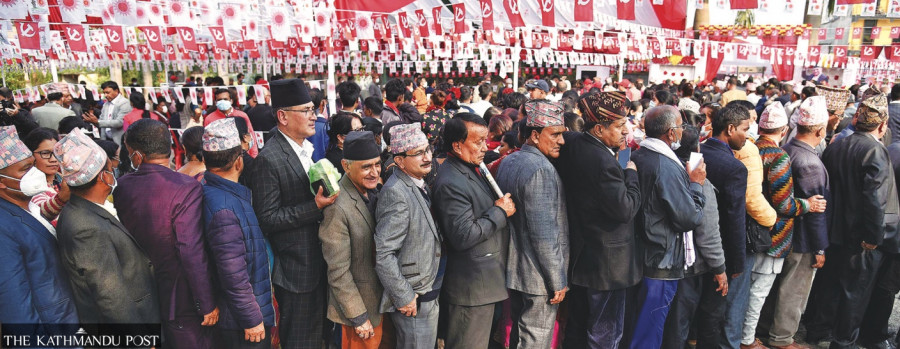
Thousands of CPN-UML cadres and supporters descended on Chitwan from around the country for the party’s general convention. Angad Dhakal/TKP
Amid a growing risk of spread of Omicron, a highly contagious variant of SARS-COV-2, that causes Covid-19, the national conventions of Nepal’s major political parties—CPN-UML, Nepali Congress, Communist Party of Nepal (Maoist Center), Rastriya Prajatantra Party—have either just concluded or are about to start.
And what is concerning is political parties are holding the conventions gathering crowds of hundreds of thousands of people.
Public health experts warned that the national conventions could turn into superspreader events and prove very costly to the country and the people.
“We should not forget that huge rallies and gatherings were held before the second wave of the pandemic hit the country,” said Dr Sher Bahadur Pun, chief of Clinical Research Unit at the Sukraraj Tropical and Infectious Disease Hospital.
“Neither the opposition nor the ruling parties paid heed to warnings of experts and continued their political functions then, and what happened, we have not forgotten.”
Over 6,000 people died of Covid-19 infection in the two months of the second wave of the pandemic. And the Delta variant of the virus, which is lethal, is still circulating in communities. Doctors say the risk of transmission of the virus currently circulating in communities will be high if one is participating in huge crowds.
Even if one forgets that there is no risk of the new variant, the existing variant Delta is still circulating in communities and making hundreds of people infected, dozens serious and people are also dying from the infection.
“One could get infected if they have not yet been infected and they can also pass the infection to their family members,” Pun added. “If someone in the family has a compromised health condition, they could get serious and even die of the infection.”
Doctors say that even vaccinated people are getting infected and being admitted to hospitals.
In the last 24 hours, 316 people have been infected (285 positive in 10,919 polymerase chain reaction tests and 31 in 1,808 antigen tests).
Three people died of Covid-19 infection. Active cases stand at 6,954.
So far, 11,529 people have died of the coronavirus.
Most of the major political parties have either led the government in the past or are currently in the government and they are well aware of the economic, health and other consequences of the pandemic.
It is estimated that hundreds of thousands of people from across the country gathered in the CPN-UML’s national convention that concluded Tuesday. The infection can spread throughout the country at once, if a highly contagious variant of the virus spreads there.
Doctors say that political parties should be role models and work for people’s safety and well being.
“It is very unfortunate that parties have neither taken any lesson from the past mistakes nor do they pay heed to the suggestions of experts.” Dr Sarad Onta, a public health expert. “Parties and their leaders believe that those parties, which can gather huge crowds, are the largest party. Without thinking about the consequences, they have been gathering huge crowds.”
Before the second wave of the infection hit the country in April, political parties were in a race to show strength. Opposition political parties were in protest against the dissolution of the Parliament and then ruling CPN-UML also organised huge assemblies to show people support the government’s move.
Onta said that holding a national convention gathering crowds of hundreds of thousands of people in one place in the midst of the pandemic cannot be justified from any angle, whose cost will be very high to the country and the people.
“I am not opposed to the idea of general conventions but given the pandemic they should be held by following Covid safety protocol,” said Onta.
The Omicron coronavirus variant has caused a strong global reaction, with countries imposing travel curbs and other restrictions, worried that it could spread fast even among vaccinated populations, concerns have grown in Nepal too.
The World Health Organisation warned on Monday that it carries a very high global risk of infection surges. As more countries reported cases, the variant has prompted border closures.
Nepal too has stopped issuing on-arrival visas to citizens from African countries.
Experts say stopping visas on arrival for people from Africa does not help to avoid the spread of the disease.
They say that fighting the virus in an effective manner needs a number of combined efforts—placing the right people in the right place, increasing tests, making testing, tracing and treatment effective and improving health infrastructure, among other things.
“Only barring entry to the people from select countries does not stop the virus from entering the country,” said Dr Krishna Man Shakya, vice president of Nepal Public Health Association. “ We should take lessons from our own experience, mistakes and also pay heed to expert suggestions.”
Experts agreed that whether the new variant will enter Nepal is a matter of when, not if.
The World Health Organisation also recommended countries to enhance surveillance and sequencing of cases. The UN health body also recommended implementing effective public health measures to reduce Covid-19 circulation overall, using risk analysis and science-based approaches.
“They should increase some public health and medical capacities to manage an increase in cases,'' reads the WHO statement issued on Sunday.
“In addition, it is vitally important that inequities in access to Covid-19 vaccines are urgently addressed to ensure that vulnerable groups everywhere, including health workers and older persons, receive their first and second doses, alongside equitable access to treatment and diagnostics.”
So far, 8,514,684 people (28 percent of the total population) have been fully immunised [double jabbed] with Covid-19 vaccine.
Meanwhile, the Ministry of Health and Population has appealed to people not to visit abroad if it is not an emergency and take precautions, as the risk of spreading a new variant of the virus has been growing.













